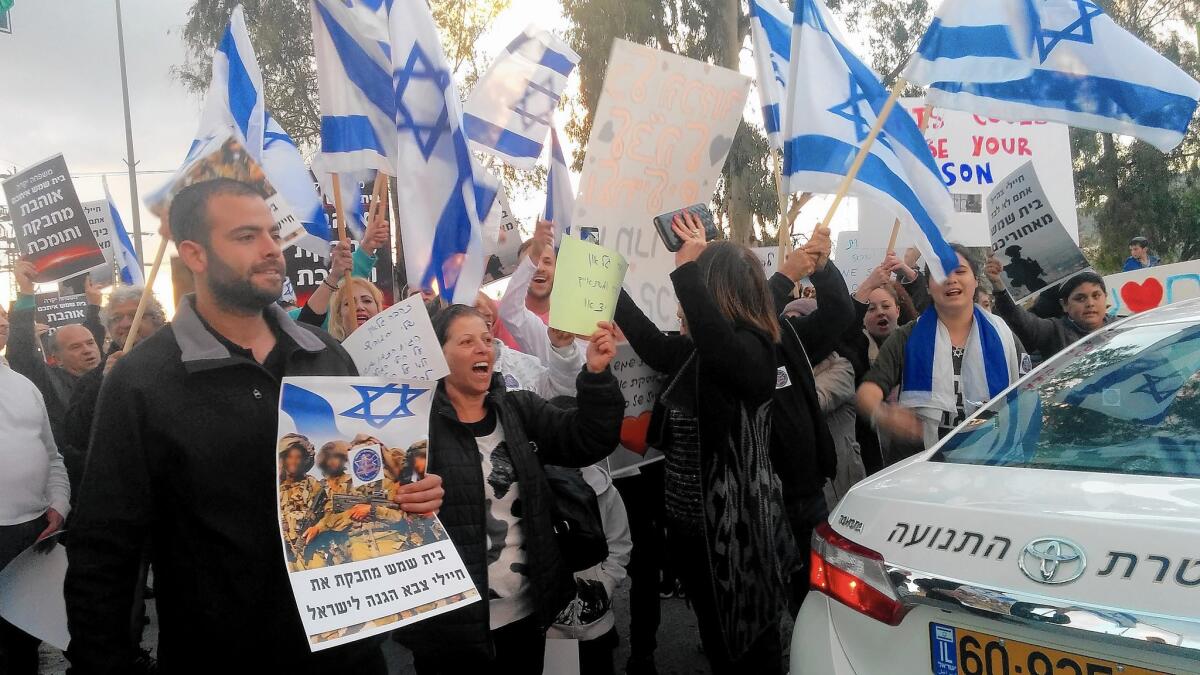Israel’s military caught in rift over soldier’s shooting of knife assailant
reporting from TEL AVIV — Israel’s military ranks among the most popular institutions in the country, winning approval ratings far outpacing the courts and the parliament. Popularity of the military chief of staff routinely exceeds that of the prime minister.
But in the days since an Israeli soldier shot to death a Palestinian knife assailant in the West Bank, a rare rift has opened up between army top brass and public opinion. A decision to pursue a court-martial against the soldier, with an expected charge of manslaughter, has spurred widespread criticism of military leaders on social networks, in public opinion polls and in the streets.
Many Israelis at solidarity protests are hailing the soldier as a national hero, while others sympathize with a conscript perceived to have acted instinctively in the throes of a dangerous situation — a claim rejected by military prosecutors and the chief of staff.
“I think the army abandoned him,’’ said Reuven Lavi, 50, the owner of a butcher shop in the city of Ramle, southeast of Tel Aviv. “He’s serving the country. Even if he made a mistake, he’s not a criminal. He’s a soldier doing his duty.’’
The military prosecutor has said in hearings that the soldier opened fire even though the Palestinian attacker, Abdel Fattah Sharif, was no longer deemed a threat. Sharif had stabbed another soldier and then was shot and apparently incapacitated. He was lying on the ground, barely moving, when the soldier approached him and appeared to shoot him in the head.
The defense has argued that the soldier feared that Sharif was wearing an explosives belt and panicked, an account the prosecution has dismissed as not credible. No such belt was found.
The shooting in the city of Hebron was caught on video by a Palestinian activist, who sent it to the Israeli human rights group B’Tselem. It renewed Palestinian accusations that Israel has a policy of summary execution, and prompted a protest from the United Nations envoy.

Israelis in Beit Shemesh show solidarity with a soldier facing court-martial in the shooting death of a Palestinian knife assailant.
At stake for the military is a struggle to enforce soldier discipline, especially in regard to its open-fire regulations, amid several months of Palestinian knife and shooting attacks. Military experts say that if the soldier, whose identity is banned from publication under a court order, isn’t prosecuted it could lead to anarchy on the battlefield and invite international efforts to try soldiers for war crimes. But the military is confronting public opinion that sees the soldier as a victim of a rush to justice fueled by hostile rights activists.
Chief of Staff Lt. Gen. Gadi Eisenkot, who had warned against disproportionate force against Palestinian knife attackers even before the Hebron shooting, sent an open letter to soldiers last week stressing the value of human dignity and “purity of arms.”
“The shots violated the professional norms and morals expected of an Israel Defense Force soldier,’’ Eisenkot told officer cadets Tuesday, according to the Israeli media. “There is an escalation … that we have to win. But on the other hand, there’s an understanding that if we don’t establish our norms as a military, we will lose.”
The controversy over the Hebron shooter follows statements from Israeli politicians and some religious leaders who argue that Palestinian assailants should be killed in the act in order to deter future attacks. Now many of those politicians are coming to the defense of the soldier and criticizing the army.
“How can a soldier that was an outstanding soldier until yesterday become handcuffed like a criminal?” asked Education Minister Naftali Bennett. “Does anyone really think we can charge a soldier with murder?”
The soldiers have become transformed in the Israeli psyche from men and warriors to our collective children.
— Ehud Eiran, military expert and political science professor at University of Haifa
Yossi Aroussi, a 67-year-old retired police officer from Ramle, predicted that an indictment would spur mass protests. “If I were there, I would have done the same thing. If you come to kill, you shouldn’t get out of it alive,’’ he said. “The army is trying to show the world that we are enlightened. Commanders are concerned about their promotions. It’s all politics.”
Lavi, the butcher, echoed the defense claims that the soldier acted impulsively in self-defense. “He was afraid,’’ he said.
A survey by Israel’s Channel 2 news television poll found 57% opposed to the military investigation and two-thirds who justified the soldier’s actions. Only 5% characterized it as murder. An indictment is expected next week.
“The phenomenon in which there are masses of people calling the soldier a hero reflects bankruptcy of education, of thought, of responsibility,’’ said Asa Kasher, a philosophy professor who helped draft the army’s code of ethics, in a radio interview. “There is no definition in the world of a hero that the soldier meets.”
Defense Minister Moshe Yaalon, a former military chief of staff, has been pushing back on public calls for support of the soldier and thousands who have joined solidarity protests. “What about ‘Thou shalt not murder?’” Yaalon said Tuesday. “As an army, it’s important to be victorious and to remain human.”
Palestinian officials say the shooting of Sharif is part of a recurring pattern by Israeli security agencies, and have called for a United Nations investigation. “These executions are not isolated events,’’ said negotiator Saeb Erekat in a March 27 statement.
The debate in Israel highlights challenges unique to its military, which relies on a mandatory draft of 18-year-olds for its foot soldiers and celebrates itself “an army of the people’’ that hews to a higher moral standard than its adversaries.
But at a time when Israeli society is increasingly fragmented and social media give a platform to anti-establishment sentiment, it’s becoming harder for the military to inculcate those values.
“There is a growing concern that the allegiances or the ears of the soldiers and junior officers is not exclusively tuned to the military high command,” said Meir Elran, a fellow at the Institute for National Security Studies at Tel Aviv University.
In recent years, those draftees are increasingly seen as kids placed in the temporary trusteeship of military commanders. Some experts have likened the sympathy for the shooter to the public support for Gilad Shalit, the Israeli soldier who was abducted and held for five years in the Gaza Strip by the Islamic militant group Hamas. Shalit was freed in 2011 after popular pressure forced the government to agree to a lopsided prisoner swap in which he was traded for more than 1,000 Palestinian inmates.
“The soldiers have become transformed in the Israeli psyche from men and warriors to our collective children,” said Ehud Eiran, a military expert and political science professor at University of Haifa.
That explains comments by some Israelis that they might discourage their children from joining front-line units after the court-martial. If the army sends a soldier to jail for killing a Palestinian assailant, better to avoid the battlefield altogether.
“I wouldn’t send my kid,” Lavi said. “If the army doesn’t support him, how can he serve?”
Mitnick is a special correspondent.
ALSO
Student slain in Bangladesh criticized religious extremists on Facebook
Another mysterious death in Kandahar, and allegations of official torture
Syria says Islamic State extremists abducted hundreds of workers near Damascus
More to Read
Sign up for Essential California
The most important California stories and recommendations in your inbox every morning.
You may occasionally receive promotional content from the Los Angeles Times.










